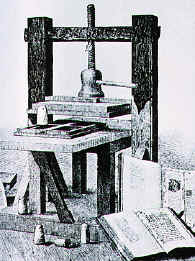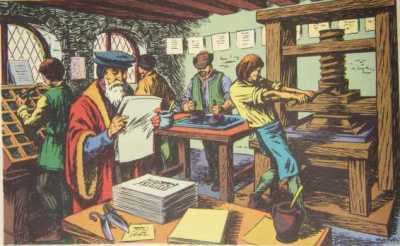An Essay: Media Culture – Marshall McLuhan & the Evolution of Publishing
The following essay is an astute and well-written essay by a student at Bangor University in Wales, UK. Marshall McLuhan said that “Gutenberg had, in effect, made every man a reader. Today, Xerox and other forms of reprography tend to make every man a publisher” (The Future of the Book (1972), in Understanding Me: Lectures & Interviews (203), p. 179). That was only partially true in 1972, as mere photocopying scarcely equates with traditional book publishing as such. But today’s digital technology and its capabilities have made the idea of every man who wishes to publish something a publisher literally true…….Alex
A printing press in the Gutenberg style invented around 1440
“Something as simple as a change in speed can change the world”.
“In a culture like ours . . . it is sometimes a bit of a shock to be reminded that, in operation and practical fact, the medium is the message.” Such is Marshall McLuhan’s introduction to a revolutionary concept in media studies (1964, p. 7). Written over a half-century ago, McLuhan’s view on media holds remarkably firm in a modern context. In this essay, we will be examining how “the medium is the message” applies specifically to innovations in publishing. After first examining the impact of the invention of the printing press in its day, we will contrast this historical event with more recent developments in the publishing industry; specifically, how Amazon, Inkshares and other companies are encouraging a move towards self-publishing. In comparing the media’s impact on the world both before and after McLuhan’s time, we can see that his famous statement on the nature of the medium consistently applies to the development of our worldwide culture.
McLuhan, in the first chapter of Understanding Media, is laborious in defining the meaning of his claim that “the medium is the message”, and equally laborious in defining what it does not mean. “Many people would be disposed to say that it was not the machine, but what one did with the machine, that was its meaning or message”, he posits, before firmly contesting the notion (McLuhan, 1964, p. 7). He explains that “the ‘content of any medium is always another medium’, and that when we focus on the content we fail to understand the bigger picture (ibid).
McLuhan defines the message of any media “as the change of scale or pace or pattern that it introduces into human affairs.” (ibid., p. 8) This is what he calls, in his book’s very title, the extensions of man. This extension, then, can be thought of as an improvement of humanity’s abilities. McLuhan observes that something as simple a change in speed can change the world, referring to the invention of movies as key example. He summarises this innovation as a speeding up of the mechanical process which “carried us . . . into the world of creative configuration and structure”(ibid., p. 12).
It is exactly this principle of media changing the world through the extension of mankind that we will test, beginning in application to the invention of the Gutenberg printing press in the 15th century. Although it is often cited as a factor in the rise of the Protestant Reformation and the fall of the Catholic Church as an absolute political power, McLuhan and his disciples notably go so far as to posit that the printing press was the cause of the reformation (Levinson, 2015).
Not all writers on the subject follow this school of thought. One such writer states that “Printing provided a catalyst, a precondition, but did not of itself cause the movement” (Cameron, 1991, p. 6). In continuing to protest the theory of direct causation, this writer argues that “The press existed for some sixty years” before the major Protestant figures arose (ibid.). This particular argument seems weak; the lack of immediacy in revolution does not decide culpability for said revolution one way or another. Another writer comes closer to McLuhan’s stance in noting that “the invention allowed ‘renaissance’ to affect many more minds” preceding the reformation (Chadwick, 2001, p. 7).
More illuminating is a comparison made on the subject by a biographer of key reformation figure Martin Luther. In his book, Bernard Lohse makes note of John Huss, a predecessor to Luther who was killed by the Catholic Church for his religious ideas (Lohse, 1987, p. 11). In comparing Luther to Huss, Lohse observes that the spread and discussion of Luther’s ideas were “only possible because the art of printing had already been developed for a few decades . . . The resulting powerful effect on public opinion on Luther’s work made it impossible for Luther to be done away with as quickly as Huss had been.” “Thus”, Lohse concludes, “the art of printing is of considerable significance for the end . . . of the Middle Ages”.
The enhanced speed of the spread of information was, to follow McLuhan’s theory, the message of the printing press. This message caused a major shift in the balance of societal power across Europe. In today’s society, we are seeing a new message in the world of publishing, and it can again be categorised as a change in speed.
With the rise of services like Amazon, authors are being offered a way to circumvent the practice of appealing to large publishing companies. This is coupled with the possibility of instantaneous publishing through the medium of e-books. Paul Levinson, a disciple of McLuhan, refers to this development as a “revolution [that is] a profound game changer for the author” (Levinson, 2014, p. 71).
Read the rest of this essay at http://tinyurl.com/n8tgbq5 ) (March 2018 – The article will be found via the Wayback Machine.)
Filed under: Academic, Articles, Commentary, Education, Ideas, New Media, Print, Publishing, Technology | 2 Comments
Tags: academic, communication, culture, education, ideas, print, technology




Thanks for the share!
To clarify, I’m not a student of Dr. Paul Levinson. I’m actually a student attending Bangor University in the UK.
LikeLike
Good for you, Jesse! The UK is a good place to study. I myself studied at the Shakespeare Institute, University of Birmingham for a while. I’ll amend the posting with that information. FWIW, I teach media studies for Gonzaga University at the MA level via online learning, and would have given your paper an A+ too.
LikeLiked by 1 person